#KPOP musical
Text

This came out so nice! This is "Amerika" from the Kpop Musical as I see it because of synesthesia!
I’m taking commissions! | Support me on Patreon!
11 notes
·
View notes
Text

Kpop musical is THAT girl
18 notes
·
View notes
Text
Losing my mind that kpop is closing faster than Diana
8 notes
·
View notes
Text

Saw KPOP on Broadway!! Impulse bought a rush ticket at the very last minute and went in completely blind. I’m not even interested in the KPop genre and frankly this experience was the closest I’ve ever been to actually listening to KPop.
AND I LOVED IT!! I can’t say I enjoyed every single bit (the first couple of scenes were a tad confusing) but in the second act everything came together. It’s so unexpectedly brave, funny and new. Definitely can relate to the theme and Mwe’s struggles. I actually like that she broke up with her boyfriend at the end. I also love how unapologetically Korean this show is, like it utilized its bilingual nature so well. Loved it.
The audience was great. It truly felt like a live concert and has to be one of the best theater experiences I’ve had, even better than some of the really popular ones.
Also the rush ticket was actually pretty cheap (in Bway standards).
10 notes
·
View notes
Text
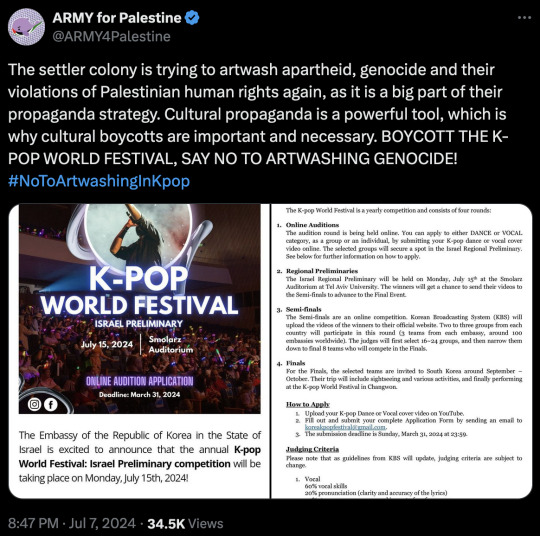


the korean embassy in isnotreal is organizing kpop world festival there and is basically a competition people can participate with the support of kbs so yeah... this is quite bad
#i don't even think this is the first time it happens since it says it's an annual thing#but it's incredibily insane how they are doing this shit with the support of kbs#during a whole fucking genocide#i need people to be mad about this shit#bc idek if they will invite groups there one day that can happen#and it should BECAUSE PEOPLE NEED TO BE LOUD#artwashing genocide with kpop music is insane and nobody should be indifferent to this#kpop#kbs
4K notes
·
View notes
Text
My sister bought me a KPOP bucket hat and fanny pack from the Broadway flea market and now I'm going to have to explain it every time someone asks me what group I like 😂
1 note
·
View note
Text
Obsessions EP85: The Little Mermaid (2023)
This is a page dedicated to documenting the various theatre news, performances and the like that Lia and Odiesia mention in the “Obsessions” segment of the show. Listen to this episode here. You can also find our fave songs playlist here.
Lia
KPOP on Broadway Cast Recording
Once Upon a One More Time clips
Halle Bailey’s debut single ‘Angel’
Odiesia
Chorus: The Game is FINALLY OUT! (first mentioned on the Camp Rock 2 episode)
#Spotify#kpop#kpop on broadway#kpop musical#once upon a one more time#britney spears#britney spears musical#chorus an adventure musical#chorus game#greek myth game#greek myth musical game#musical game#luna#halle bailey
0 notes
Text



I know . ۫ ꣑ৎ . I've loved you ⋆✴︎˚。⋆ . ݁ ₊ ⊹ . ݁˖ . ݁


₊˚⊹ 𐦍༘⋆₊ ⊹ from the start 𝄞 ⨾𓍢ִ໋𓂃 ࣪˖ ཐིཋྀ ✶⋆.˚



#kpop moodboard#moodboard gg#gg messy moodboard#gg moodboard#taeyeon moodboard#winter moodboard#minjeong moodboard#karina moodboard#aespa moodboard#aespa messy moodboard#white moodboard#cute moodboard#color moodboard#colorful moodboard#random moodboard#lq moodboard#brown moodboard#brown messy moodboard#beige moodboard#vintage moodboard#beige messy moodboard#indie moodboard#alternative moodboard#grunge moodboard#aesthetic moodboard#music moodboard#moodboard#simple moodboard#fresh moodboard#aespa messy icons
2K notes
·
View notes
Text
☆ "HEY, THIS IS SUNGHOON FROM ENGLISH CLASS..."
or in which, sunghoon and yn go from classmates, to friends to lovers thanks to a simple text.
pairing: park sunghoon x f!reader
warning/contents: smau, cursing, kms/kys jokes, tiny bit of angst, jealous hoon + requested by @pprodsuga !
back to masterlist!


















taglist: @0x1lovebot @fairybinie @odetoyeonjun @pockyandme @soobin-chois @lolalee24 @sensitively-taken @junityy @kaimal @laylasbunbunny @jaeyunverse @enhacolor @honglynights @starry-mins @bibinnieposts @yoonzin0 @4xiaojun @pointlessapple @equalheart @angelyeo-hyj @enluv @notseiu @dokyeomkyeom @isoobie
please do not copy, repost or steal any of my work. all content belongs to @odxrilove
#k-labels#en-log#enhypen x reader#enhypen smau#sunghoon smau#sunghoon x reader#enhypen sunghoon#enhypen sunghoon x reader#enha sunghoon x reader#enha smau#enha x reader#enha sunghoon#sunghoon#park sunghoon#park sunghoon x reader#enhypen x y/n#sunghoon x y/n#enha x y/n#enhypen fluff#enha fluff#kpop fluff#kpop x reader#kpop smau#! music articles .. 💿
1K notes
·
View notes
Text
A candid image of me cleverly tricking my unsuspecting friends into sharing an interest with me so I have someone to infodump to

#don’t worry I tailor the traps to everyone specially:))#infodumping is a love language#the interests include but are not limited to#stranger things#our flag bbc#banana fish#mdzs#qsmp#kpop#haikyuu#mcyt#anime#yuri on ice#newsies#animal crosing new horizons#musicals#music#dsmp#shoutout my sister for dealing with this constantly#omg hit tweet! /j
7K notes
·
View notes
Text
how do y'all not let the things you like consume your entire being
#i've never been normal about anything i like#like i do not experience post-yap shame#kpop#anime#music#tomorrow x together#stray kids#bts#demon slayer#attack on titan#given anime#buddy daddies#sk8 the infinity#yuri on ice#my hero academia#supernatural#criminal minds#bbc sherlock#mdzs#the avengers#batman#superman#taylor swift#phoebe bridgers#hozier#my chemical romance#sleeping with sirens#fall out boy#panic! at the disco#i hit the tag max
2K notes
·
View notes
Text

This came out really pretty! This is "This Is My Korea" from the Kpop Musical as I see it because of synesthesia!
I’m taking commissions! | Support me on Patreon!
9 notes
·
View notes
Text
If you want, you can let me know the language(s) in the tags, and whether or not you speak it fluently!
#my mom acts like it’s super weird to enjoy music in another language so i got curious about how many of you do!#i’m not sure what to tag this#polls#kpop#jpop#cpop#music#spotify#bilingual
11K notes
·
View notes
Text



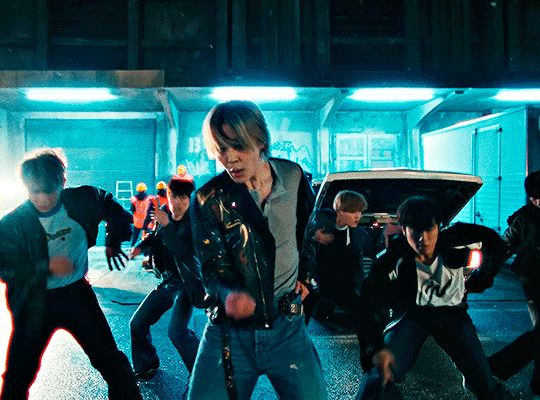








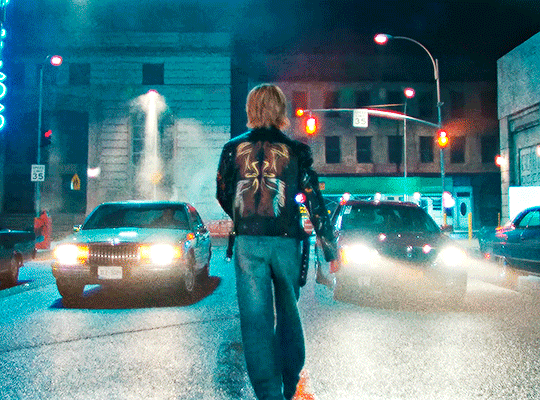
JIMIN 'Who' Official MV
#bts#jimin#park jimin#dailybts#pjmdaily#ksoloists#ultkpopnetwork#usermusic#dailymusic#dailymusicians#dailybg#trackofthesoul#userpat#userdimple#raplineuser#annietrack#usermaggie#userkelli#usersky#mygifs#btsedit#btsgif#jimin who mv#muse#jimin muse#muse by jimin#kpop#pop#pop music
685 notes
·
View notes
Text
The Rise and Fall of ‘KPOP’

Why is this groundbreaking Broadway musical closing so soon? The tale of its creation, evolution, marketing, and critical reception offers plenty of clues—and some glimmers of hope.
BY MARCUS SCOTT
KPOP will play its final Broadway performance this Sunday, Dec. 11, after 44 previews and 17 performances (during previews, the show canceled multiple matinee performances and one of the leads got COVID, prompting producers to move its official opening night to Nov. 27, one week after its initial opening celebration). This makes this historic musical the shortest-running Broadway musical since Neil Bartram’s The Story of My Life shuttered after 19 performances in 2009.
Cancellations and delays have become commonplace as Broadway rebounds from a pandemic and a global quarantine that affected all live gatherings, but theatre in particular. The closure and slow return has had a major impact on Broadway, with 2021-22 revenue and attendance taking major hits, falling from the historic record of $1.829 billion set by the 2018-19 season to the total of $845.4 million last season. These statistics by the Broadway League indicate a plunge of 54 percent, marking a drop in audience attendance, which saw a record high of 14.7 million in 2019 but fell to 6.72 million this past year. Shows like the long-running Phantom of the Opera and A Strange Loop—an artistic triumph which won the Pulitzer Prize for Drama and earned the Tony Award for Best musical at this year’s ceremony—will end their respective runs on Broadway early next year. Even Stomp, the Off-Broadway percussion-and-movement mainstay, is set to end its 29-year run at the Orpheum Theatre next month.
One might surmise that KPOP, a pop musical penned and composed by three hip yet largely unknown theatre artists, was in part a casualty of some of these seismic forces. But the story isn’t that simple. Like many shows, it faced delays and cancellations due to COVID, but ticket sales were markedly anemic throughout the show’s preview period, leading many to point fingers at the show’s faulty marketing efforts to attract younger audiences and fans of the increasingly popular Korean music genre that gives the show its title.
And then there was the question of the show’s critical reception, which was decidedly mixed. Most reviews weren’t positive, with at least one major exception (Variety posted a rave), but it didn’t help that The New York Times’s Jesse Green had nothing nice to say about the show, comparing it unfavorably to KPOP’s 2017 Off-Broadway staging and writing that “those who aren’t hard-core fans of the genre or don’t understand Korean” would probably not enjoy the show (a bizarre appraisal, considering the show is performed primarily in English, with occasional Korean lyrics and dialogue, and with its Playbill making history as the first to be bilingual). Green also received criticism for referring to Jiyoun Chang’s million-dollar kilowatt lighting designs as “squint-inducing,” an unfortunate word choice that led many to perceive his review as racist, even if unwittingly so; producers and cast members went so far as to ask Green and the Times for an apology, though none was forthcoming.
Naturally, when news broke that the show would end its run just two weeks after its official opening, the theatre community went into an uproar about what went wrong with a show that so many—and not just those involved in its making— thought deserved a better chance to find an audience.
“Globally, this is a case of how the status quo of Broadway marketing (run by predominantly white people) fails to lift up projects attempting to bring new diverse audiences to Broadway,” wrote associate director Seonjae Kim via e-mail.
How did KPOP arrive at this crossroads? Just before Thanksgiving and the show’s postponed opening night, I spoke with members of the creative team. The behind-the-scenes story of this groundbreaking musical is a tale of intense collaboration, evolving perceptions and intentions, and a lot of creative tinkering. Just as KPOP deserved a longer run, this story ought to be told.
Blast Off
On a mid-November afternoon, when I finally got in touch with composer Helen Park, she was holed up in the lower lobby of the Circle in the Square Theatre between rehearsals, surrounded by a wall of placards and production photos taken at the venue over its celebrated 50-year history. Connecting over FaceTime, our initial hellos were a bit klutzy. It’s not every day you’re tasked with interviewing a friend, after all: Park and I both attended New York University’s Tisch School of the Arts, where we enrolled into the Graduate Musical Theatre Writing Program in 2011. There we spent two years finessing our craft, fidgeting with our skill sets, and finding our voices. Similar to my own experience, Park faced and fought the stereotypes and preconceptions of patronizing elders in the musical theatre field. She’s a global citizen woman of color who writes radio-friendly ditties with an effervescent pop sheen, in the face of a post-Sondheim white cis-het male-dominated industry; I’m a lower-middle-class Black poet and journalist-turned-librettist-songwriter who had more in common with the security guards manning the entrances than the trustafarian hipsters and preppies who frequented the campus.
Park handled it all like a boss, probably because she has a knack for proving others wrong. At the age of 5 in Busan, Korea, she began playing classical piano, learning Schubert, Chopin, and Rachmaninoff. At age 9, her father’s studies brought her to Missouri for two years, where she played state-level competitions. In sixth grade, she attended a musical theatre summer school in Virginia, cementing her love of the craft with a production of Mary Rodgers’s musical comedy Once Upon a Mattress. After attending middle school back in her native Korea, she convinced her parents to send her more than 7,000 miles away to a Christian conservative boarding school in Alberta, Canada, where she would spend her high school years listening to ’90s and early-2000s Korean pop ballads as a source of comfort and connection. After a stint studying life sciences, she moved to the Big Apple, where she befriended co-lyricist and co-composer Max Vernon.
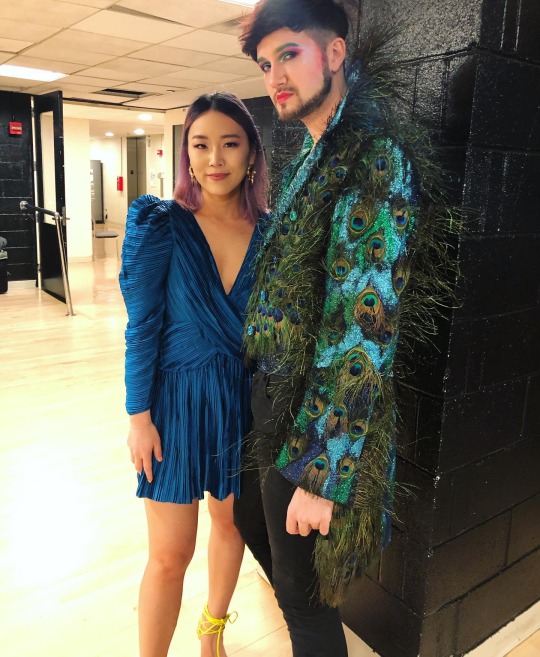
Vernon and Park’s collaborations began in graduate school, when a joint assignment led to The Lament of Asian Girl #3, a satirical romp about stereotypes and casual racism in the film and theatre industries. Park told me she really responded to Vernon’s lyrical style, describing it as edgy, fresh, and singular. In 2014, Park was approached by Vernon, who was already in talks with Ars Nova about developing a musical about K-pop; Vernon introduced her to director Teddy Bergman of Woodshed Collective, as well as co-conceiver and librettist Jason Kim. She then partook in a sort of bake-off developmental workshop, alongside AAPI storyteller A. Rey Pamatmat, playwright Jeremy Lloyd, and the songwriting team of Maggie-Kate Coleman and Erato A. Kremmyda.
“We were experimenting with having many different composers write this score,” said Park, who music-directed and contributed two songs to that initial workshop. “But we all felt there needed to be cohesiveness to the score, because they were all so different from each other. So Max and I became a team from there.”
Bergman described the origin of KPOP as an “arranged marriage” orchestrated by Ars Nova, with artistic director Jason Eagan and former associate artistic director Emily Shooltz bringing together a team to explore an immersive show set in the K-pop universe. Little did he know that Kim and Vernon, members of Ars Nova’s Uncharted program, had already been ruminating on the same subject. After a successful series of workshops in 2016, Ars Nova greenlit the musical for a limited engagement.
Meant 2 Be
For those who saw the 2017 production, including many critics, the new Broadway version of KPOP feels more like a reinvention than a reboot—a spiritual successor from an alternative timeline or fictional metaverse, if you will. Performed in the expansive A.R.T./New York Theatres space, the Off-Broadway production divided audience members into groups who were given a tour of JTM Entertainment, a fictional K-pop music factory owned by South Korean power couple Moon (played by James Saito) and his wife Ruby (Vanessa Kai), hoping to break into the North American market with their brand of infectious pop. Tapping the San Diego-born Korean American agent Jerry (James Seol), they strategized to tip the scales in their favor, plotting world domination with their contagious confection of earworms.
Theatregoers who toured the multilevel, multiroom facility were then introduced to the five-member boy band F8, the six-singer girl group Special K, and Seoul’s reigning glitterball prima donna, MwE (Ashley Park, in a star turn before her Tony-nominated performance as Gretchen Wieners in Mean Girls). They also met the company’s toxic in-house plastic surgeon Dr. Park (David Shih), ferociously vicious vocal coach Yazmeen (Amanda Morton), and ruthless dance instructor Jenn (Ebony Williams, last seen as a backup dancer on Beyonce’s Formation tour and best remembered for the “Single Ladies” music video).
Onlookers observed as the JTM artists were put through the wringer: Required to participate in mandatory rehearsals to flawlessly execute physically demanding vocal and dance exercises, they were also expected to workshop and generate new recorded material around the clock, to cultivate their fickle fandom via social media, to receive media training, and to confront their body dysmorphia via a rhinoplasty examination for any facial imperfections. And this summary barely scratches the surface of a show that also addressed themes of xenophobia, racism, and child labor.

Audiences, and most critics, relished the soap opera-esque storytelling, with larger-than-life Asian performers playing multi-dimensional protagonists rather than sidekicks or tertiary tropes. That iteration of KPOP would go on to become the most nominated show of the 2017-18 theatrical season, taking home the Lortel Award for Outstanding Musical, a Richard Rodgers Award, and an Off-Broadway Alliance Award for Unique Theatrical Experience, while earning multiple nominations for both the Drama Desk Awards and Drama League Awards.
Even before the show received these plaudits, a Broadway transfer seemed imminent, with lines trailing down city blocks and theatregoers cosplaying as characters from the show. Yet no one could predict the trajectory of pop culture, or of Broadway, within the demi-decade to come, and that’s where things get tricky.
Super Star
Five years later, there’s no denying that K-pop has found a home in the land of Stars and Stripes. Just ask the legions of superfans backing radio leviathans like Blackpink (the highest-charting K-pop girl group on the Billboard Hot 100 and Billboard 200), Seventeen (the first K-pop group to be nominated and win the MTV Push Performance of the Year), Girls’ Generation (recent Guinness World Records holders), SuperM (the first Asian artists to top the chart with a debut release) and BTS (the first act to have six consecutive No. 1 singles on the Hot 100 in the shortest amount of time since The Beatles), to name a few. While there has yet to be a singular crossover superstar equivalent to the likes of Lizzo, Billie Eilish, Anitta, Doja Cat, or Olivia Rodrigo, it is only a matter of time before K-Pop produces its own international superstar. Blackpink’s Lisa, who was recently honored at the 2022 Video Music Awards for Best K-Pop for her solo single “Lalisa,” could be a contender.
KPOP director Teddy Bergman recalled a sold-out BTS concert at MetLife Stadium in 2019, marveling at “the umbrella of who was in that crowd, not only AAPI audience members, but just a wildly diverse audience base there, singing along to songs in Korean.” Bergman, the son of first-generation German Jewish refugees, added, “Seeing that radical expansion brings up questions of, when the tent of your music gets so large, what piece are you holding onto? Like, is there a question of the dilution of the form as you’re spreading it further and further and you’re reaching a wider audience?”
Among other things, such rapid development in the cultural milieu meant that the writers would have to update their references. Vernon said that when the show was initially conceived, the creative team was influenced by an earlier generation of K-pop stars: Wonder Girls, Girls’ Generation, SHINee, 2NE1, Big Bang, Exo, Psy. By the time the show was headed to Broadway, the songwriting team had turned their ears to a new generation: BTS, Blackpink, NCT 127, Seventeen, New Jeans, Monsta X, and Vernon’s personal favorite, Lee Tae-min of Shinee and the supergroup SuperM. For her part, Park name-checked inspirations as wide-ranging as You Hee-yeol of the one-man band Toy, R&B music icon Stevie Wonder, global music megastar Michael Jackson, jazz, and ’90s sentimental pop ballads.
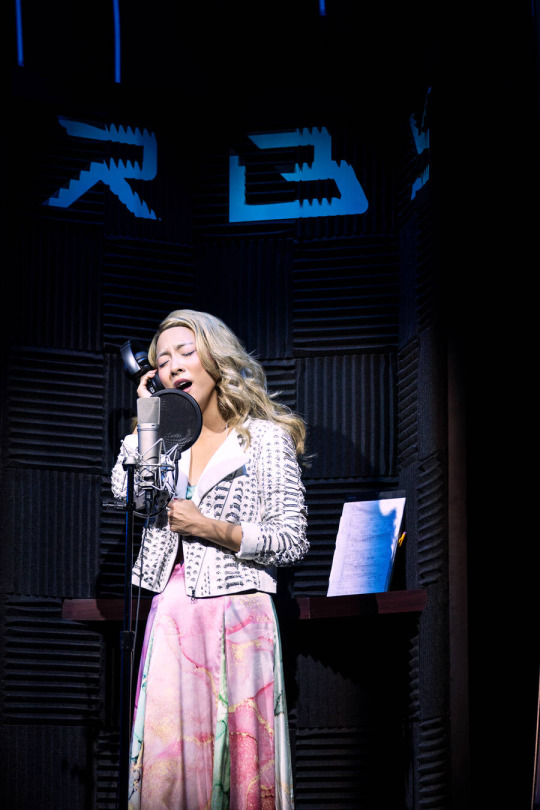
Changing perceptions of K-pop would also demand a different focus for the show: The burning question for the KPOP characters this time around wouldn’t be whether these acts would go mainstream, but rather what they would be forced to sacrifice in that crossover: their identity, as they assimilate into the global market, or their autonomy and individuality as they reach the upper echelons of fame?
The other big challenges of the Broadway transfer were scale and form: Not only were none of the 41 Broadway theatres equipped to present an immersive experience of the kind the previous KPOP had, but, as book writer Jason Kim wrote in an email, the original script “was over 500 pages. We had to include so much content to fill every corner of every room in the building. Cutting out parts of the story happened by necessity, but we also embraced it as an opportunity to distill the story down to its most essential points.”
The result that’s currently at Broadway’s intimate Circle in the Square features an 18-member cast and four swings, including real-life K-pop idols Kevin Woo (of boy band U-KISS), Min-Young Lee (of girl group Miss A), and Bohyung Kim (of girl group Spica and music duo Keembo), not to mention Korean multimedia singer-star Luna. Audiences are on hand to observe rehearsals for a one-night-only concert affair to be presented by a K-pop corporation called RBY Entertainment, which is looking to introduce their roster to America. K-pop impresario and momager Ruby (an attention-grabbing Jully Lee) is hedging her bets with three of them: the newly formed RTMIS (pronounced Artemis), the riveting F8 (pronounced fate), and her muse and prima donna of the dancefloor MwE (pronounced mu-wee), an orphan Ruby has personally raised for fame. The show’s form now resembles a combination of early-aughts VH1-style Behind the Music docudrama and memory play, telling the story of MwE’s road to superstardom through flashbacks and snapshots of her life, from her initial audition as a wide-eyed tween with big dreams and impressive pipes through the elaborate, Vox Lux-esque stage performances of her first world tour.
The new version of KPOP is in fact mostly focused on MwE and her struggles for independence, artistic freedom, individuality, work-life balance, and childhood trauma. While stage time in the 2017 production was evenly distributed, the stories of the other bands have been significantly if necessarily streamlined: Special K has been whittled down to the five-member RTMIS, though F8 has expanded from five to eight members. (And gone is MwE’s supposed younger shadow self, waiting in the wings to dethrone her.) Instead the new script introduces Juny, MwE’s guitar-plucking, golden-voiced boyfriend, who is intent on rescuing her from her gilded cage (played by a delightful Jinwoo Jung, seen in KPOP Off-Broadway as F8 member Oracle). Recording the spectacle is fame-hungry documentary filmmaker Harry (played by Aubie Merrylees, in a thankless part), who wants to turn the concert and its behind-the-scenes drama into a vehicle that will land him recognition and awards on the festival circuit.
On paper, this all sounds fine. But when one makes comparisons to that edgy original Off-Broadway production, the trials and tribulations faced by the RBY artists in the Broadway production come across as champagne problems. In the original production, the F8 segment focused on the cultural divide between South Korea and the U.S.; the Special K segment focused on the intersection of racism and sexism with regard to the unrealistic expectations of perfection; and the MwE segment interrogated the commodification of child stars. On Broadway, only the latter concern is truly explored in depth, while the challenges facing F8 are merely glimpsed and the RTMIS story is virtually non-existent.
There’s also the difference between Jerry and Harry. In the 2017 script, Jerry was a Korean American who had bought into respectability politics and the model minority myth, and was enforcing assimilation and cultural agility on the talent under his care. Jerry wasn’t a simple villain, as at the climax he realized his error and faced his internalized racism. But in the new script, Harry is little more than a stand-in for the exploitative, imperalist white gaze, demanding that the biracial, people-pleasing Brad (Zachary Noah Piser) translate what the other boy band members are saying in Korean in return for a stronger spotlight in the documentary.
Songwriter Vernon explained these choices in part as a result of the sea change in K-pop’s popularity.
“When we started writing almost nine years ago, it was about whether or not K-pop could transfer and cross over to an American pop market, and we were asking ourselves questions of what would the sacrifices those artists would have to make in terms of their own personal and cultural identity to appeal to American audiences,” Vernon told me during a break from rehearsal for their show The Tattooed Lady, which ran just before KPOP‘s opening at the Philadelphia Theatre Company. “I think one of our main assumptions was that there would have to be a much greater cultural sacrifice, so we had this character of Jerry, this American consultant who was encouraging the K-pop artist to do things that were in many ways harmful to who they were, hiding who they were in order to appeal to America. At the end of the show, the realization was that actually the best way to appeal to America is just that the K-pop artists be fully themselves; they don’t need to cross over to us, we need to cross over to them. In 2017, that was a really powerful message, but since we did the show, K-pop has crossed over.”
Added Park, “Through the pandemic, there was this reckoning. Asian Americans and people of color started grappling with their own identity; it was so important to us to honor as much authenticity as we can for K-pop and Korean pop culture, so our focus kind of shifted, which meant the story had to change. Instead of asking, why hasn’t K-pop crossed over into the U.S., we started to go into what is the experience of being a K-pop star? What is the joy and exhilaration, but also the sacrifice?”
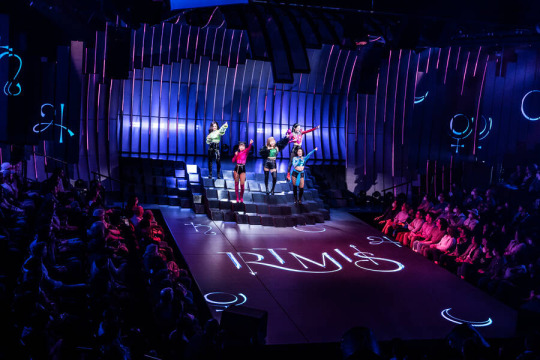
Still, without the animating drama of crossover, audiences for the new KPOP—both K-pop diehards and the uninitiated—may be confused about what they are supposed to take away from the show. Here’s where the critiques of Jesse Green and others, however pointed or problematic, aren’t totally unfounded. By making such changes, one could argue that the KPOP team turned one of the most singular, innovative, and genre-bending triptych theatrical productions of the last 25 years into one of the most traditional, bare-bones, and sanitized productions of the post-pandemic era. Instead of showing the rot beneath the sparkling ruby, this version of KPOP only covers it up with more precious gems; the sharp, subversive edges of the original were dulled and smoothed down or completely obscured, and the darker extremities explored in 2017 trimmed away.
I think the creative team made the incorrect assumption that because K-pop has exploded in the U.S., Americans are likewise familiar with South Korean customs and culture, which couldn’t be further from the truth. You would never guess from KPOP that South Korea has one of the highest suicide rates among OECD member nations, with a 2016 study finding that 30 percent of South Koreans suffer from mental illness, though only half seek treatment. Or that in the last five years, there have been a string of notable suicides in the Seoul music industry, including songwriter-producer Kim Jonghyun of Shinee, barrier-breaking industry rebel Sulli of f(x), and actress-singer Goo Hara of Kara. Imagine the power of a script in which the animosity between F8 members and hapa newcomer Brad arose in part because the band member he replaced had committed an act of self-harm instead of simply being mysteriously fired. Or, given K-pop’s trend of queer-baiting, its litany of “skinship” performances from acts like NU’EST, VIXX and OnlyOneOf, having an openly queer member of F8 would have certainly added nuance. Imagine what that could have done for songs like “Han Guk Nom (Korean Man)” and conversations around Asian masculinity in South Korea’s often conservative Christian society. (John Yi’s commanding, laugh-out-loud performance as F8’s smoldering Danny, for example, would be an obvious choice for this storyline.) This would not only have honored the queer artists who have penned some of the genre’s biggest hits, but the LGBTQIA+ artists who penned KPOP itself.

All of this is not to say that the new KPOP didn’t make improvements. Park Sun-young, known internationally as Luna, gives a nuanced performed as MwE, and the fact that Luna’s own career trajectory bears striking similarities to MwE’s adds a layer of meta-authenticity that wasn’t a part of the 2017 Off-Broadway run. Following a 2006 appearance on the Seoul Broadcasting System reality TV show Truth Game, Luna was scouted by the powerhouse label SM Entertainment prior to making her debut as the main vocalist and lead dancer of South Korean hipster girl group f(x), alongside Victoria, Amber, Krystal, and Sulli in 2009. The quintet earned critical and commercial success domestically and internationally, becoming the first K-pop act to perform at SXSW. And with her role in KPOP, Luna is the first K-pop idol to have a leading role on Broadway.
That’s not the only historic first marked by KPOP: It’s also the first Korean-centric musical with Korean, Korean American, and AAPI representation (on- and offstage) to grace the Great White Way, and only the third Broadway musical to highlight Asian American heritage with Asian Americans in both the cast and the creative team. Helen Park makes history as the first Asian American woman composer of a Broadway musical, and only the sixth Asian composer ever. And Luna isn’t the only one making her Broadway debut; so is almost the entire cast (Zachary Noah Piser, Eddy Lee, Major Curda, and Aubie Merrylees are the exceptions). That places a lot of undue pressure on a show like this, leaving little room for error—ironic for a show about artists striving for perfection.
Phoenix
So why is the show closing? A sentiment shared among industry observers and theatregoers is that the marketing team backing KPOP just didn’t make enough of an effort to target contemporary enthusiasts of the K-pop genre. The producers seem to have hoped those fans would be attracted by the K-pop recording stars in the cast, but there’s a fallacy in this logic: The idol industry cycles through performers cursorily, so that there’s not enough collective memory for that to translate to tickets sales or merchandise (another theme and plot point in the original Off-Broadway production that is all but absent this time around).
“There are a myriad of complicated reasons why KPOP is closing its doors prematurely,” wrote associate director Seonjae Kim in an email. “But in my opinion, a big one is the marketing and outreach. Our social media endeavors were essentially non-existent until it was way too late in the game to build buzz. Many posts were low-effort and failed to utilize even the most basic of algorithm principles (like using hashtags). There are many accounts of cast and team members reaching out with impressive personal connections and promotional opportunities that went unanswered. In my opinion, there was zero strategy and innovation on how to market this incredibly non-traditional show to non-traditional audiences.
She continued, “Amidst the sadness, it’s been a real pleasure to see to see that our houses do not look like a typical Broadway-going audience: so many young folks, AAPI folks, folks carrying signs for their favorite K-pop star in the show. From their enthusiasm, and the fervent energy of the social media campaign once we announced our closing, I have really come to believe we missed our opportunity to tap into the immense spending power of so many who were hungry to see something so different on Broadway. We could have and should have reached so many more of them. I hope that future shows can learn from what happened to us. I hope that how theatre is funded, marketed, and sold can catch up with the innovations of the stories being told.”
A day before the news of the closing broke, producers announced that Sony Masterworks Broadway will release a cast album of the show on Feb. 24, 2023, with record producer Harvey Mason Jr. (one half of the production duo The Underdogs), a veteran hitmaker who has been very prominent in the K-pop scene, at the helm alongside music director Sujin Kim-Ramsey. The show’s blend of power ballads, reggaetón, glow-in-the-dark EDM, nu-disco, progressive house, techno, hip-hop, trap, and Korean wave dance-pop should make it the most anticipated cast album of the season. It will undoubtedly introduce the show to many more folks who could see it during its short run. And who knows? It could even give KPOP a chance at a second life or a future remount, given its massive appeal to young audiences and K-pop fans. If that does happen, future producers will hopefully have learned that the show needs something more than the usual marketing approach and word-of-mouth.
For now, its creators are celebrating the moment while it lasts.
“There is something still inherently radical about this cast, these bodies, inhabiting this story, on this stage, especially out of an unbelievably difficult set of years for everyone and for everyone in very different ways,” said director Teddy Bergman from his Brooklyn apartment as he prepared for an emergency rehearsal. “There’s a tremendous amount of joy on that stage, and I think experiences of collective joy and stories of redemption and hard-won strength and release are necessary public rituals at this moment in time.”
In a new essay for Playbill, Helen Park shares a story about her own young son that demonstrates one way the show is a hit, no matter its box-office numbers.
“He told me he wanted to be in KPOP when he grows up, ‘if it still exists,’” she writes. “He might be too young to realize the significance and the rarity of this, but he saw himself represented onstage, loud and proud, flawed and complicated. He saw himself represented as fully human, on the Great White Way. That’s the moment I felt like I must have done something right.
“I see audiences like my son every night, young and old. I see how their eyes light up as they see themselves represented in the form of superstars. Perhaps for some of them, they’re superheroes.”
Marcus Scott is a New York-based playwright, musical writer, and journalist. He’s written for Architectural Digest, Time Out New York, The Brooklyn Rail, Elle, Essence, Out, and Playbill, among other publications.
The article originally misstated the timing and source of quotes from Seonjae Kim. It failed to mention that a lead getting COVID was a factor in the postponement of opening night, and it also stated incorrectly that the entire cast is making their Broadway debut.
#Marcus Scott#MarcusScott#American Theatre Magazine#KPOP#KPOP musical#Broadway#Off Broadway#Max Vernon#Helen Park#Jason Kim#Teddy Bergman#Seonjae Kim#LUNA#fx#Kevin Woo#ukiss#kpop broadway
0 notes
Text



𝙹𝙰𝚁𝙳𝙸𝙼 ✿. 𝗳𝗹𝗼𝗿𖬺͟𝗲𝘀𝘀𝗲̂𝗻𝗰𝗶𝗮
𝐞𝐬𝐭𝐚𝐜̧𝐚̃𝐨. 秋天 ─── 𝟎𝟐
𝗆𝖾𝗅𝗈𝖽𝗒, 𝗅𝗂𝗍𝖾𝗋𝖺𝗍𝗎𝗋𝖾 𖬺͟비❀냄새

¹旋律 ’ ♡.𝗉𝗂𝗇𝗀𝗈𝗌 𝖽𝖾 𝖼𝗁𝗎𝗏𝖺
𝐧𝐨𝐭𝐚𝐬. 𝒻𝗋𝖺𝗀𝗆𝖾𝗇𝗍𝗈𝗌-𝖽𝖾-𝖽𝗈𝗋
愛翻譯’♥︎ ─── 𝗉𝗈𝖾𝗌𝗂𝗌



#͏ ͏ ͏ ͏ ͏ ͏ ͏ ͏ ͏ ͏ ͏ ͏ ͏ ͏ ͏ ͏ ͏ ͏ ͏ ͏ ͏ ͏ ͏ ͏ ͏ ͏ ͏ ͏ ͏ ͏ ͏ ͏ ͏ ͏ ͏ ͏ ͏ ͏ ͏ ͏ ͏ ͏ ͏ ͏ ͏ ͏ ͏ ͏ ͏ ͏#spotify#spotify playlist#spotify layouts#spotify bios#kpop messy#messy bios#bios#cute#soft#messy#coquette#messy random#kpop#messy aesthetic#korean ullzang#ullzang icons#ullzang moodboard#ullzang girl#ullzang layouts#messy moodboard#moodboard#kpop moodboard#symbols#messy symbols#tumblr aesthetic#literature#music playlist#playlist#moodboard aesthetic
607 notes
·
View notes